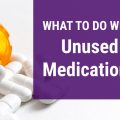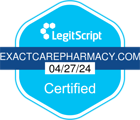
Managing Asthma and Chronic Obstructive Pulmonary Disease (COPD)
Asthma and COPD symptoms can be different for everyone. There isn’t one universal treatment and both diseases make it difficult to breathe.
Asthma
Symptoms of asthma include:
- Wheezing
- Breathlessness
- Feeling tightness in the chest
Triggers like exercise, allergies, chemical fumes, gases, or dust can cause an attack, but taking medication can help reduce symptoms. While there isn’t a cure for asthma, it can be controlled.
COPD
COPD is a lung disease that leads to restricted airflow and breathing problems. Common types include emphysema and chronic bronchitis.
Some common symptoms are:
- Frequent coughing or wheezing
- Excess phlegm or mucus production
- Shortness of breath and trouble taking a deep breath
COPD can be treated with medication, but there isn’t a cure. Sometimes oxygen can be prescribed to help make breathing easier.
Asthma and COPD can both be diagnosed through a test that measures lung function.
What is the difference between a maintenance inhaler and a rescue inhaler?
Maintenance Inhaler: Long-term control medications to reduce asthma-related tightening of the airways that make it difficult to breathe. Maintenance inhalers are typically prescribed for daily use. They help suppress the immune system chemicals that can activate asthma and COPD symptoms.
Maintenance inhalers should be used daily as scheduled to help control asthma and COPD.
Rescue Inhaler: Starts working quickly to open and relax the airways in the lungs so it is easier to breathe. They are meant to “rescue” a person if breathing becomes difficult. Rescue inhalers are not meant to be used on a daily basis.
Oftentimes, a patient can be prescribed both types of inhalers to manage daily and long-term symptoms.
Rescue inhalers are also called short-acting inhalers. They should only be used as needed. Some examples include when you’re experiencing shortness of breath, wheezing, or before exercise.
How to Use an Inhaler:
If it’s your first time using a new inhaler or if you haven’t used yours for a while, you may need to set it up. This is also called priming an inhaler. Each one comes with specific instructions outlining when and how. Once the inhaler is primed, follow the steps outlined below:
- Take the cap off.
- Make sure nothing is inside the mouthpiece.
- Shake the inhaler for ten to fifteen seconds before each use.
- Take a deep breath out and try to push out as much air as you can.
- Exhale completely before using the inhaler and try to count to ten while holding your breath after using the medication. This will allow it to reach deeper into your lungs.
- Wait thirty seconds between doses if a second one is needed.
If you’re using a steroid inhaler, you should rinse out your mouth with water after each use. This will help prevent throat irritation or fungal infection known as thrush.
To stay healthy and minimize symptoms, it’s important to take your asthma and COPD medication as directed. If you have questions about your medications, pharmacists are a great resource and are happy to help. They can instruct you how to use your inhaler and answer any questions you may have.
Will an Inhaler Work if it’s Expired:
Most inhalers expire one year after they are removed from the foil pouch. If they have not been removed from the foil pouch, check the expiration marked on the inhaler. Beyond that point, they are not guaranteed to be safe or effective.
Inhalers are usually stored in purses or backpacks, meaning they are exposed to temperature, light and humidity changes. The more exposure the inhaler has, the quicker the medication becomes less effective.
It’s important to protect the canister and always put the protective cap back on after each use. It could burst if it gets punctured and the canister could get damaged without being secured properly.
The safest option is to request a new inhaler from your doctor or pharmacist if you notice yours is expired or damaged.
If you take multiple medications for asthma, COPD or any health conditions – it can be hard to remember when to take each dose. We specialize in making it easier to take medications as prescribed. To learn more, call us at 1-844-287-1609.
Information featured on the ExactCare website, including the Ask a Pharmacist page, should not be considered medical advice. Please consult your pharmacist or doctor for advice regarding your personal health situation. If ExactCare is your pharmacy, call us directly to talk to your pharmacist: 1-877-355-7225







